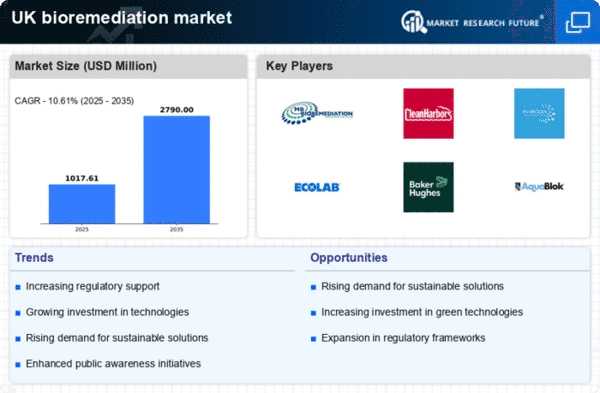Increasing Environmental Regulations
The bioremediation market in the UK is experiencing growth due to the increasing stringency of environmental regulations. The UK government has implemented various policies aimed at reducing pollution and promoting sustainable practices. For instance, the Environment Agency has set guidelines that encourage the use of bioremediation techniques for soil and water decontamination. This regulatory framework not only mandates compliance but also incentivizes industries to adopt bioremediation solutions, thereby expanding the market. As a result, companies are investing in bioremediation technologies to meet these regulations, which is expected to drive market growth. The bioremediation market is projected to reach a valuation of approximately £1.5 billion by 2027, reflecting a compound annual growth rate (CAGR) of around 8% from 2025 to 2027.
Investment in Research and Development
Investment in research and development (R&D) is a key driver of the bioremediation market in the UK. Increased funding from both public and private sectors is facilitating the exploration of new bioremediation methods and the enhancement of existing technologies. Research institutions and universities are collaborating with industry players to develop innovative solutions for soil and water remediation. This focus on R&D is expected to yield breakthroughs that improve the efficacy and applicability of bioremediation techniques across various sectors. As a result, the market is likely to benefit from a steady influx of new technologies and methodologies, potentially increasing its overall market value by 15% by 2027.
Rising Industrial Waste Management Needs
The bioremediation market is significantly influenced by the rising need for effective industrial waste management solutions. Industries in the UK are generating increasing amounts of hazardous waste, necessitating innovative approaches to waste treatment. Bioremediation offers a cost-effective and environmentally friendly alternative to traditional waste disposal methods. The UK’s industrial sector, particularly in manufacturing and chemical production, is under pressure to adopt sustainable practices. This has led to a growing demand for bioremediation services, as companies seek to mitigate their environmental impact. The market is expected to grow as more industries recognize the benefits of bioremediation, potentially increasing its market share to 30% of the overall waste management sector by 2026.
Advancements in Bioremediation Technologies
Technological advancements are playing a crucial role in shaping the bioremediation market. Innovations in microbial treatments and bioaugmentation techniques are enhancing the efficiency of bioremediation processes. The development of genetically modified organisms (GMOs) and novel bioremediation agents is enabling faster and more effective remediation of contaminated sites. These advancements not only improve the effectiveness of bioremediation but also reduce the time and costs associated with traditional remediation methods. As a result, the market is likely to see an influx of new players and technologies, further driving competition and growth. The bioremediation market is anticipated to grow at a CAGR of 7% over the next five years, reflecting the impact of these technological innovations.
Growing Public and Corporate Environmental Responsibility
There is a noticeable shift towards greater environmental responsibility among both the public and corporations in the UK. This trend is influencing the bioremediation market as consumers increasingly prefer products and services that demonstrate environmental stewardship. Corporations are responding by integrating sustainable practices into their operations, including the adoption of bioremediation techniques for waste management. This growing awareness and demand for eco-friendly solutions are prompting businesses to invest in bioremediation technologies. As a result, the market is likely to expand, with projections indicating a potential increase in market size by 20% by 2028, driven by corporate sustainability initiatives and consumer preferences.
















